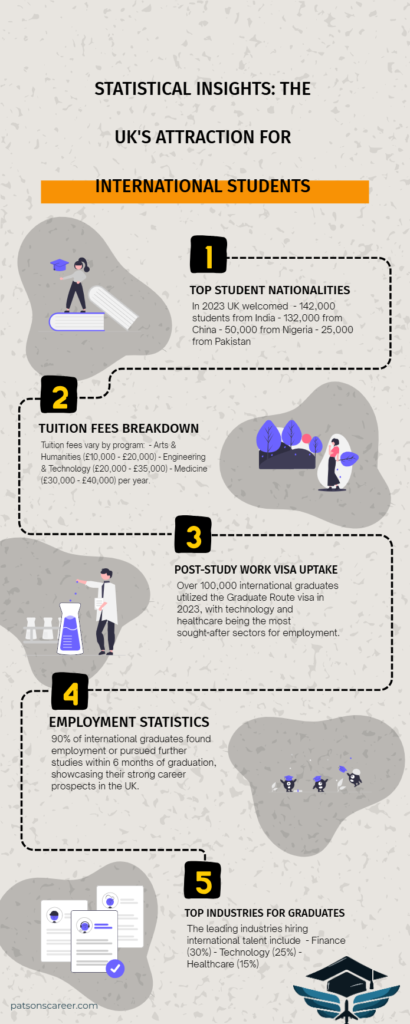The UK has long been a sought-after destination for students aspiring to study abroad. With its world-class education system, cultural diversity, and opportunities for professional growth, it offers a promising pathway for students to transition from academia to career success. In this blog, we’ll walk you through the essential steps of studying and building a career in the UK, alongside key insights and tips to ensure a seamless journey.
Why Choose the UK for Higher Education?
- Globally Recognized Universities: The UK hosts some of the top-ranking institutions like the University of Oxford, University of Cambridge, and Imperial College London.
- Shorter Course Durations: Undergraduate programs are usually 3 years, and master’s programs often take just 1 year to complete.
- Cultural Diversity: With students from over 200 countries, the UK is a melting pot of cultures, offering an enriching social environment.
- Strong Employability: UK degrees are highly regarded by global employers, opening doors to career opportunities worldwide.
Key Steps to Get Started
- Choose the Right Course and University
- Research universities based on their global rankings, course structure, and campus facilities.
- Use tools like UCAS (Universities and Colleges Admissions Service) for undergraduate applications.
- For postgraduate programs, direct applications to universities are common.
- Plan Finances and Scholarships
- Tuition fees range between £10,000 – £40,000 per year depending on the course and university.
- Look for scholarships like the Chevening Scholarship, GREAT Scholarships, and Commonwealth Scholarships.
- Visa and Application Process
- Apply for a Tier 4 (General) Student Visa, which allows you to stay and study in the UK.
- Be prepared with your offer letter, financial proof, and a valid English proficiency test score (IELTS/TOEFL).
Life as a Student in the UK
- Accommodation: Options range from university dorms to private rentals. Shared apartments are a popular and cost-effective choice.
- Student Discounts: Utilize discounts on transportation, books, and entertainment with a student card.
- Part-Time Work Opportunities: International students can work up to 20 hours per week during term-time and full-time during holidays.
- Student Support Services: Universities offer mental health support, career counseling, and international student help desks to assist with cultural adaptation.
Internship and Job Opportunities for International Students
- Internships:
- Many universities offer placement years or sandwich programs to help students gain work experience during their degree.
- Top industries include finance, technology, engineering, healthcare, and creative arts.
- Post-Study Work Visa (Graduate Route):
- After graduation, students can stay in the UK for 2 years (3 years for PhD graduates) to look for work.
- This allows students to gain valuable work experience and build connections in their field of study.
Career Growth and Pathways to Permanent Residency
- Transitioning from Student to Professional:
- Make the most of university career fairs and networking events.
- Build a LinkedIn profile and connect with alumni working in your target industry.
- Securing a Job with a Skilled Worker Visa:
- Many international graduates apply for roles that lead to a Skilled Worker Visa, which allows them to work long-term in the UK.
- Permanent Residency (Indefinite Leave to Remain):
- After working for 5 years on a Skilled Worker Visa, individuals can apply for permanent residency, opening doors to further career growth.
Challenges and How to Overcome Them
- Cultural Adjustment: Engage in university clubs and activities to meet new people and understand the local culture.
- Managing Finances: Use budgeting apps and explore part-time work options to manage expenses effectively.
- Navigating the Job Market: Stay updated on industry trends, enhance your skills with certifications, and actively network.

Statistical Insights: The UK’s Attraction for International Students
- Top Student Nationalities (2023):
- India: 142,000 students
- China: 132,000 students
- Nigeria: 50,000 students
- Pakistan: 25,000 students
- Tuition Fees Breakdown:
- Arts & Humanities: £10,000 – £20,000 per year
- Engineering & Technology: £20,000 – £35,000 per year
- Medicine: £30,000 – £40,000 per year
- Post-Study Work Visa Uptake:
- Over 100,000 graduates utilized the Graduate Route visa in 2023.
- The technology and healthcare sectors were the top employers for international graduates.
- Employment Statistics:
- 90% of international graduates found employment or pursued further studies within 6 months of graduation.
- Top industries hiring international talent:
- Finance: 30%
- Technology: 25%
- Healthcare: 15%
Contact our overseas education consultants here for more information and a detailed discussion on making your overseas education and career a success.

